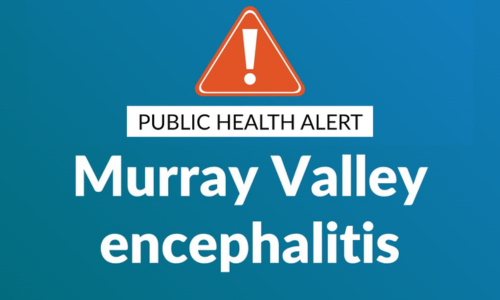Murray Valley encephalitis public health alert
The Northern Territory (NT) is currently experiencing an outbreak of Murray Valley encephalitis (MVE), with 7 confirmed cases this year, including 2 deaths. Territorians are urged to protect themselves and children from mosquito bites.
This is the highest number of cases ever recorded in a single year and compares to 2 cases over the previous 5 years across the Territory.
The 7 cases of MVE acquired in the NT to date in 2023 include 2 in the Big Rivers region, both in young infants, 3 in the Barkly region, and 2 in the Top End region.
Following the rise in MVE cases, NT Health is urging Territorians and visitors to the NT to protect themselves and children from mosquito bites.
MVE is an uncommon but potentially fatal disease that occurs after being bitten by a mosquito carrying the MVE virus. The only way to prevent MVE is through avoiding mosquito bites.
The symptoms of MVE include severe headache, high fever, drowsiness, tremor, seizures (especially in young children), and in some cases the disease can progress to delirium, coma, permanent brain damage or death. Children are at greater risk of developing severe disease, and very young and older people are more likely to have long-term health problems following an infection.
Japanese encephalitis (JE) is another serious and potentially fatal mosquito-borne disease that occurs in the NT. There have been 3 cases of JE recorded since February 2021, including one death.
Mosquitoes that can transmit MVE and JE are most active after sundown, during the night and early in the morning. Numbers are expected to be elevated close to wetlands, and will remain elevated until mosquito breeding sites dry out.
People in remote communities and anyone visiting parks and recreation areas where mosquitoes may be active are also at greater risk.
To protect themselves and children from mosquitoes, people should:
- use a protective repellent containing DEET, Picaridin or oil of lemon eucalyptus (PMD)
- use an appropriate repellent for children. Always follow the instructions on the label and apply it safely. From the age of 2 months onwards, repellents containing 10% DEET can be used, and from the age of 12 months, repellents containing Picaridin can be used. Oil of lemon eucalyptus (PMD) can be used from 3 years of age. Repellents are not recommended for children under 2 months of age
- wear light-coloured protective clothing (long sleeves, trousers, socks) when outdoors in mosquito prone areas and ensure that children’s arms and legs are covered
- avoid outdoor exposure around dusk and dawn, and at night near areas of dense vegetation or areas of high mosquito activity
- use mosquito-proof accommodation and camping facilities at night
- use mosquito coils, mosquito lanterns and barrier sprays containing bifenthrin in patio and outdoor areas near houses
- use mosquito proof netting over prams and strollers.
To find out more about MVE, go to the Northern Territory Government website.

